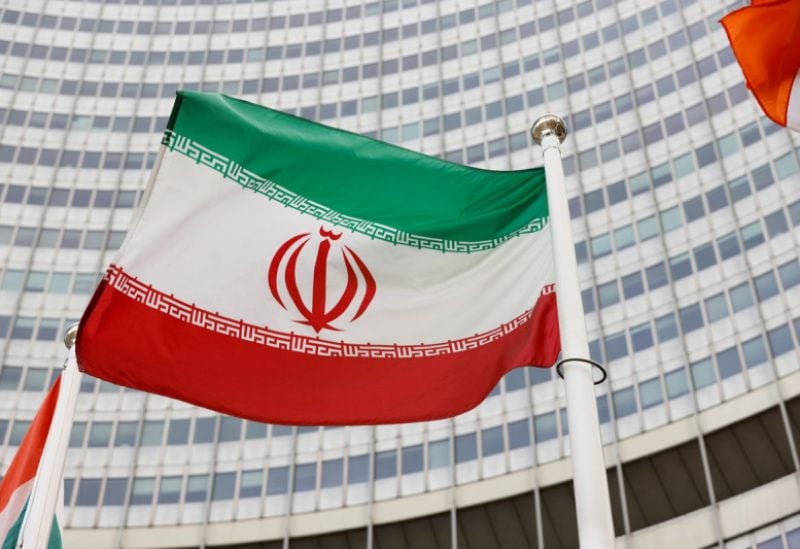
The Iranian flag waves in front of the International Atomic Energy Agency (IAEA) headquarters, amid the coronavirus disease (COVID-19) pandemic, in Vienna, Austria May 23, 2021. REUTERS/Leonhard Foeger/File Photo
Demonstrations were renewed in several Iranian cities with increasing pressure on authorities to release the detainees amid calls for civil disobedience.
Protesters called for extensive participation to commemorate the mid-Nov 2019 protests, and schoolgirls made a “national appeal” to gather and participate in the three-days marches starting Tuesday.
Students of several universities continued their two-month protest movement, with several strikes at the Sharif University of Technology, the Tehran University of Art, and Al-Zahra University.
Students carried on with their protest and demanded the release of their detained colleagues and political prisoners.
A video circulated on social media showed a march at Qazvin University in support of activist Hossein Ronaghi, whose health has deteriorated in Evin Prison.
Hasan, Ronaghi’s brother, said Hussien was transferred to Dey General Hospital. He called on Iranians to gather in front of the hospital to prevent security forces from moving him back to prison.
Ronaghi has been on a hunger strike since his arrest on Sept. 24 during the protests fueled by Mahsa Amini’s death.
On Monday, the Iranian judiciary said that Ronaghi was taken to hospital and his health was “stable,” denying claims that he had been physically injured before the hospitalization.
“Ronaghi’s general state of health is stable, and he will soon be released from the hospital,” according to AFP, citing the Iranian judiciary website, Mizan.
The website noted that authorities decided to send him to a hospital outside the prison to avoid any possible deterioration in his clinical condition and for him to receive additional treatment.
Later, Mizan published a photo of Ronaghi’s meeting with his mother at the hospital. Reports said that the authorities allowed his parents to enter the hospital to visit him and check his condition.
The family reported that Ronaghi’s kidneys had developed hydronephrosis due to the hunger strike and that he could not walk because his leg was broken during detention.
According to his brother, Ronaghi also began refusing water on Saturday in protest of the authorities’ refusal to release him for treatment.
The activist has previously published articles in newspapers, including the Wall Street Journal, criticizing the human rights situation in Iran.
The Oslo-based Iran Human Rights Organization expressed concern over reports of Ronaghi’s deteriorating health.
Director of the organization Mahmood Amiry-Moghaddam said that Ronaghi’s life was in great danger, adding that Iranian officials, especially Supreme Leader Ali Khamenei, bear the responsibility for the safety of detainees.
Video also emerged on social media showing the moment Mehdi Hazrati, 17, was shot by security forces in Karaj during a march on Nov. 03 when mourners were paying tribute to Hadis Najafi at the cemetery to mark 40 days after she was killed in the city.
The head of the judiciary in Alborz described the incident as “suspicious,” noting that the security personnel at the scene were not carrying firearms.
Meanwhile, an Iranian official in Khorasan announced the death of a Basij security force member during the unrest.
The French Press Agency said that the Basij member was shot by “rioters and anti-revolutionary elements” while he checked their identification cards in Mashhad.
Iranian authorities have adopted various tactics to quell the protests, which have become one of the country’s most significant challenges since the 1979 Islamic Revolution.
Security forces used live ammunition, tear gas, and paintballs.
Iran accused the Western countries of orchestrating the protest. The UK, Canada, the EU, and the US imposed sanctions on Tehran over its human rights violations.
The activist HRANA news agency said 341 protesters had been killed in the unrest, including 52 minors. Thirty-nine members of the security forces had also been killed, while nearly 15,820 have been detained in 140 cities, it said.
Meanwhile, the Coordinating Council of Iranian Teachers’ Trade Associations (CCITTA) called for an expansion of strikes and civil disobedience, calling on citizens to refrain from paying water, electricity, and gas bills.
The committee criticized 43 years of “self-punishment” imposed by the authority and blamed it for the “artificial inflation.”
The statement noted that 70 percent of the Iranian people live below the poverty line.